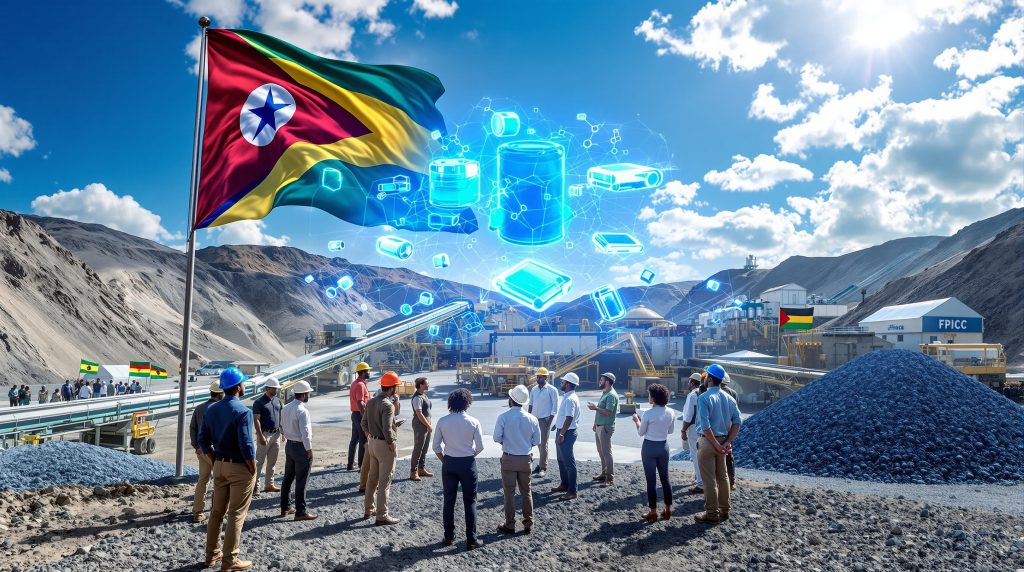DRC-Africa Battery Metals Forum: Transforming Africa's Critical Minerals Industry
The DRC-Africa Battery Metals Forum has emerged as a pivotal gathering that shapes the future of Africa's battery metals investment landscape, bringing together industry leaders, government officials, investors, and technology innovators. This strategic event, held in Kolwezi, serves as a crucial platform for addressing the challenges and opportunities within the battery metals ecosystem across the African continent.
What is the DRC-Africa Battery Metals Forum?
The DRC-Africa Battery Metals Forum represents a specialized industry gathering focused on Africa's strategic position in the global battery metals supply chain. Unlike broader mining conferences, this forum maintains a laser focus on battery metals with particular attention to Africa's unique position and potential.
The forum creates a neutral ground where stakeholders across the entire battery metals ecosystem can engage in meaningful dialogue. Government representatives, mining executives, equipment suppliers, technology providers, investors, financial institutions, consultants, NGOs, and academic researchers all convene to address sector-specific challenges and explore collaborative opportunities.
According to recent industry reports, the forum has attracted growing international attention as global demand for battery metals continues to surge amid the clean energy transition. Mining Review Africa noted that exhibitors at the most recent forum "reflected on their experience over the past two days, highlighting how the event was beneficial to their companies and met their expectations."
What distinguishes this forum from other mining events is its specialized focus on battery metals specifically, particularly within the African context. While other conferences may cover a broader range of minerals and regions, the DRC-Africa Battery Metals Forum creates a concentrated environment for addressing the unique challenges and opportunities related to cobalt, lithium, nickel, graphite, and other critical battery materials.
Why is the DRC Critical to Global Battery Metal Supply?
The Democratic Republic of Congo holds a position of unparalleled importance in the global battery metals landscape. The country currently produces approximately 70% of the world's cobalt supply, making it the single most important source for this critical battery metal. This dominance gives the DRC significant leverage in global supply chain discussions and positions it as a key player in the worldwide energy transition.
The geological uniqueness of the DRC's copper belt contributes to its cobalt dominance. The region's ore bodies contain some of the highest-grade cobalt deposits globally, with cobalt typically recovered as a by-product of copper mining operations. This geological advantage creates natural economic efficiencies that are difficult for competing jurisdictions to match.
Beyond raw production volumes, the DRC's strategic importance is amplified by several factors:
- Supply Concentration Risk: The concentration of such a high percentage of global cobalt production in one country creates supply security concerns for manufacturers and governments.
- Growing Demand Projections: Industry forecasts suggest cobalt demand could triple by 2030, driven primarily by electric vehicle battery production.
- Processing Capacity Development: The DRC government has increasingly pushed for in-country processing of minerals rather than exporting raw materials.
- Geopolitical Significance: The country's mineral wealth has attracted significant international investment, particularly from Chinese companies seeking to secure battery material supply chains.
Despite its resource advantages, the DRC faces substantial challenges in maximizing the value of its mineral wealth. Infrastructure limitations, governance concerns, artisanal mining complexities, and social development needs all present obstacles that the forum works to address through collaborative dialogue.
How Does the Forum Support Africa's Battery Metals Industry?
Building Regional Collaboration
The DRC-Africa Battery Metals Forum serves as a catalyst for pan-African cooperation in the battery metals sector. By bringing together representatives from multiple African nations with complementary resources and capabilities, the forum helps forge partnerships that strengthen the continent's collective position.
Regional collaboration initiatives discussed at the forum include:
- Cross-border infrastructure development projects connecting mining regions with processing facilities and ports
- Harmonization of regulatory frameworks to facilitate smoother trade in battery minerals
- Knowledge sharing between countries at different stages of battery metals industry development
- Joint investment promotion strategies to attract international capital
- Collective negotiation approaches for improving Africa's position in global supply chains
These collaborative approaches recognize that while individual African countries may lack the complete set of resources and capabilities needed to develop end-to-end battery supply chains, coordinated regional efforts can create more competitive and resilient industry structures.
Addressing Sustainability Challenges
Sustainability considerations occupy a central position in forum discussions, reflecting both external pressures and internal recognition of their importance for long-term industry viability.
Key sustainability themes addressed include:
- Environmental Management: Techniques for minimizing water usage, reducing emissions, preventing acid mine drainage, and implementing progressive rehabilitation
- Community Relations: Approaches for meaningful community consultation, benefit-sharing mechanisms, and conflict resolution protocols
- Responsible Sourcing: Systems for ensuring mineral provenance, eliminating child labor, and meeting international certification standards
- Climate Impact: Strategies for reducing carbon footprints in mining and processing operations
- Biodiversity Protection: Methods for identifying and preserving critical ecosystems near mining operations
The forum provides a platform for sharing practical case studies of successful sustainability initiatives, helping to disseminate best practices across the industry. This knowledge exchange is particularly valuable for smaller operators who may lack the resources to develop comprehensive sustainability programs independently.
Showcasing Technical Innovation
Technological advancement represents a core focus area for the forum, with significant attention given to innovations that can improve efficiency, sustainability, and traceability in battery metals production.
Notable technological developments highlighted at recent forums include:
- Blockchain-based traceability systems that track minerals from mine to battery
- Advanced sorting technologies that improve resource recovery rates
- Energy-efficient processing methods that reduce both costs and environmental impacts
- Digital twin technologies for optimizing mining operations in real-time
- Remote sensing applications for environmental monitoring and compliance verification
The forum's exhibition space provides technology providers with opportunities to demonstrate these innovations directly to potential users, accelerating adoption rates across the industry.
What Makes the Kolwezi Forum Significant?
Strategic Location Selection
The decision to host the forum in Kolwezi carries profound symbolic and practical significance. As the heart of the DRC's cobalt mining region, Kolwezi provides forum participants with immediate proximity to the industry they're discussing.
The location offers several distinct advantages:
- Operational Context: Participants can observe actual mining and processing operations firsthand, providing crucial real-world context for discussions.
- Local Stakeholder Access: The location enables greater participation from local community representatives, government officials, and smaller mining operators who might be unable to attend international events.
- Technical Understanding: Being in the physical environment where mining occurs deepens participants' appreciation of technical, environmental, and social challenges.
- Economic Impact: The forum itself contributes to the local economy, demonstrating the broader benefits the industry can bring beyond direct mining activities.
This strategic positioning in Kolwezi creates an environment where discussions remain grounded in operational realities rather than theoretical abstractions, leading to more practical and implementable outcomes.
Exhibition Opportunities
The forum's exhibition component serves as a vital technology and service showcase, creating a marketplace where solutions providers can connect directly with potential clients facing specific operational challenges.
The exhibition area features displays from a diverse range of companies:
- Mining equipment manufacturers demonstrating specialized machinery for African operating conditions
- Process technology providers showcasing innovations in mineral recovery and refining
- Environmental management specialists offering solutions for waste reduction and rehabilitation
- Safety equipment suppliers presenting the latest personal protection and hazard mitigation technologies
- Software developers displaying digital tools for operational optimization
- Financial institutions outlining funding options for project development
These exhibitions create tangible business development opportunities while also spreading awareness of new solutions that can address industry challenges. The interactive nature of the exhibitions allows for direct feedback between users and technology providers, contributing to the development of more appropriate technologies for African conditions.
Networking Platform
Perhaps the forum's most valuable function is its role as a structured networking environment that facilitates meaningful connections between complementary stakeholders.
The networking architecture includes several deliberate elements:
- Scheduled Business Matchmaking: Pre-arranged meetings between parties with complementary interests, based on detailed participant profiles
- Informal Social Events: Relaxed environments conducive to relationship building and information exchange
- Topic-Focused Roundtables: Small-group discussions on specific challenges where participants can identify potential collaborators
- Technical Workshops: Interactive sessions where participants work together on practical problems, revealing natural partnership opportunities
- Site Visits: Shared experiences that create natural contexts for deeper conversations about observed operations
This multi-layered networking structure dramatically increases the probability of productive connections forming compared to less structured events, leading to higher rates of actual business relationships and collaborations emerging from the forum.
What Topics Are Covered at the Forum?
Policy and Regulatory Frameworks
Regulatory discussions at the forum address the complex and evolving policy landscape affecting battery metals across Africa. These sessions bring together government officials, mining companies, legal experts, and civil society representatives to explore how regulatory approaches can balance investment attraction with national development objectives.
Key policy themes include:
- Analysis of emerging resource nationalism trends and their implications for investment
- Comparative studies of successful mining code reforms across different African jurisdictions
- Examination of environmental permitting processes and their effectiveness
- Discussion of community benefit requirements and implementation mechanisms
- Review of fiscal regimes including royalties, taxes, and development contributions
These policy-focused sessions help create greater mutual understanding between regulators and industry participants, potentially leading to more effective and balanced regulatory frameworks.
Investment Climate Analysis
Financial considerations receive substantial attention at the forum, with sessions dedicated to unpacking the investment landscape for battery metals projects across Africa.
Investment discussions typically cover:
- Risk Assessment Methodologies: Frameworks for evaluating political, operational, and financial risks specific to battery metals projects
- Capital Raising Strategies: Approaches for attracting different types of investors from venture capital to development finance institutions
- Project Financing Models: Structures that can make projects bankable despite challenging jurisdictional factors
- ESG Requirements: Evolving investor expectations regarding environmental, social, and governance performance
- Valuation Approaches: Methodologies for properly valuing battery metals assets in a volatile price environment
These sessions help bridge information gaps between project developers and capital providers, potentially increasing investment flows into the sector.
Supply Chain Development
The forum places significant emphasis on strategies for developing more complete battery metals supply chains within Africa, rather than simply exporting raw materials.
Supply chain discussions explore:
- Midstream Processing Opportunities: Technical and economic requirements for establishing refining operations
- Logistics Infrastructure: Transportation needs for moving materials efficiently between production stages
- Market Access Strategies: Approaches for connecting African producers with international customers
- Supply Security Concerns: Methods for addressing buyer worries about concentration risk
- Quality Control Systems: Processes for ensuring products meet the exacting specifications of battery manufacturers
These discussions help identify bottlenecks in existing supply chains and develop strategies for addressing them through collaborative action.
How Does the Forum Address Value Addition?
Local Processing Initiatives
Value addition through in-country processing represents one of the forum's central themes, reflecting a widespread desire across African governments to capture more of the value chain within their economies.
Processing discussions typically address:
- Technical Prerequisites: Equipment, infrastructure, and expertise required for different processing stages
- Economic Viability Analysis: Cost structures and scale requirements for competitive operations
- Skills Development Programs: Education and training needs for building local technical capacity
- Infrastructure Requirements: Power, water, and transportation needs for processing operations
- Environmental Considerations: Pollution control and waste management for processing activities
Case studies of successful African processing operations receive particular attention, providing practical templates that can be adapted to new contexts.
Manufacturing Potential
Looking further downstream, the forum also explores Africa's longer-term potential to participate in actual battery manufacturing activities.
Manufacturing discussions examine:
- Staged Development Approaches: Realistic pathways from mineral production to component manufacturing
- Partnership Models: Structures for collaboration with established battery manufacturers
- Technology Transfer Requirements: Knowledge and intellectual property considerations
- Market Development Strategies: Approaches for building customer relationships and trust
- Competition Analysis: Realistic assessment of Africa's advantages and disadvantages in battery manufacturing
While recognizing the substantial challenges involved, these discussions help establish vision and practical first steps toward greater African participation in battery manufacturing.
What Are the Key Outcomes of the Forum?
Partnership Formation
Concrete business relationships represent the most tangible outcomes of the forum, with many participants reporting that connections made at the event led directly to commercial arrangements.
Partnership types that commonly emerge include:
- Mining companies forming joint ventures to develop new projects
- Technology providers establishing distribution agreements with local partners
- Engineering firms securing service contracts with operating mines
- Financiers identifying promising investment opportunities
- Research institutions establishing collaborative programs with industry
The forum's structure deliberately maximizes opportunities for such relationships to form, with dedicated time and space for partnership discussions and agreement formalization.
Knowledge Transfer
Beyond commercial relationships, the forum facilitates substantial knowledge exchange between participants with different expertise and experience.
Knowledge transfer occurs through:
- Formal presentations sharing research findings and operational learnings
- Interactive workshops demonstrating specific techniques or methodologies
- Informal discussions between professionals facing similar challenges
- Documentation and publications capturing key insights
- Post-forum working groups continuing specific lines of inquiry
This knowledge diffusion helps accelerate the development of the African battery metals sector by allowing participants to learn from others' experiences rather than repeating mistakes.
Industry Standardization
The forum also contributes to the development of common standards and practices across the African battery metals industry, helping to raise overall performance levels.
Standardization efforts address:
- Environmental performance metrics and reporting formats
- Community engagement protocols and benefit-sharing models
- Worker safety requirements and training approaches
- Material traceability systems and documentation methods
- Quality control procedures and certification processes
These standardization initiatives help improve the industry's overall reputation and make African battery metals more attractive to international buyers with stringent sourcing requirements.
How Can Companies Maximize Their Participation?
Strategic Exhibition Planning
For companies exhibiting at the forum, careful preparation significantly increases the return on their investment.
Effective exhibition strategies include:
- Targeted Messaging: Tailoring displays and materials to address specific regional challenges
- Solution Demonstration: Showing rather than telling how technologies solve real problems
- Local Relevance: Emphasizing adaptations or applications specific to African conditions
- Case Study Presentation: Featuring successful implementations in similar environments
- Interactive Elements: Creating engaging experiences that attract and retain visitor attention
Companies that approach exhibitions with clear objectives and tailored presentations consistently report better outcomes than those using generic corporate materials.
Engagement Strategies
Active participation throughout the forum yields substantially better results than passive attendance.
Productive engagement approaches include:
- Advance Research: Identifying key potential partners and learning about their needs before the event
- Senior Representation: Sending decision-makers who can commit to relationships on the spot
- Contribution Focus: Adding value to discussions rather than simply promoting offerings
- Follow-up Discipline: Systematically pursuing connections made during the event
- Long-term Perspective: Building relationships over multiple forums rather than expecting immediate results
These engagement strategies help companies build authentic relationships based on mutual value rather than transactional interactions.
Measuring Return on Investment
Companies that define clear success metrics before attending can better evaluate their participation and improve their approach over time.
Useful measurement approaches include:
- Lead Qualification: Assessing not just the number but the quality of connections made
- Knowledge Acquisition: Evaluating new insights gained about markets or technologies
- Competitive Intelligence: Understanding competitor positioning and offerings
- Brand Perception: Gathering feedback on how the company is perceived by potential partners
- Relationship Advancement: Tracking the progression of existing relationships
This measurement discipline helps companies refine their forum participation strategies over time, generating increasingly better returns on their investment.
FAQ About the DRC-Africa Battery Metals Forum
Who typically attends the DRC-Africa Battery Metals Forum?
The forum attracts a diverse range of participants representing the entire battery metals ecosystem. Attendees typically include:
- Government officials from mining ministries and regulatory bodies
- Mining company executives from majors, mid-tiers, and juniors
- Equipment manufacturers and technology providers
- Engineering and consulting firms
- Private equity investors and project financiers
- Development finance institutions
- Academic researchers and industry analysts
- Non-governmental organizations focused on mining impacts
- Community representatives from mining regions
This diversity creates a comprehensive industry cross-section, enabling multifaceted discussions that consider all stakeholder perspectives.
What makes this forum different from other mining conferences?
The DRC-Africa Battery Metals Forum distinguishes itself from broader mining events through several key characteristics:
- Specialized Focus: Exclusive concentration on battery metals rather than mining in general
- Strategic Location: Positioning in Kolwezi places it at the heart of actual operations
- Balanced Representation: Equal emphasis on government, industry, and civil society participation
- Action Orientation: Structured to produce tangible outcomes rather than just discussions
- Technical Depth: Detailed examination of specific operational challenges and solutions
- Regional Perspective: Pan-African approach rather than single-country focus
These distinguishing features make the forum particularly valuable for stakeholders specifically involved in battery metals rather than general mining.
How does the forum address artisanal mining concerns?
Artisanal and small-scale mining (ASM) receives substantial attention at the forum, reflecting its significant role in the DRC's cobalt production landscape.
ASM discussions typically address:
- Formalization Approaches: Strategies for bringing artisanal operations into regulated frameworks
- Safety Improvements: Techniques for reducing accident risks in informal operations
- Fair Market Access: Models for ensuring artisanal miners receive reasonable prices
- Cooperative Structures: Organizational forms that can improve artisanal miners' position
- Coexistence Models: Frameworks for industrial and artisanal operations to work alongside each other
These discussions bring together diverse perspectives including government regulators, large mining companies, artisanal mining representatives, and civil society organizations to develop practical solutions to complex challenges.
What role do technology providers play at the forum?
Technology companies participate actively in the forum, serving as both solution providers and innovation catalysts.
Their contributions include:
- Operational Efficiency Solutions: Technologies that reduce costs or increase productivity
- Environmental Management Systems: Solutions that mitigate mining's ecological footprint
- Traceability Technologies: Systems that track materials through complex supply chains
- Safety Innovations: Equipment and systems that protect worker wellbeing
- Data Management Platforms: Tools for improving decision-making through better information
Technology providers often use the forum to gather direct feedback from potential users, helping them refine their offerings to better meet real-world needs in the African context.
Further Exploration
The DRC-Africa Battery Metals Forum represents just one element in the broader ecosystem supporting Africa's critical minerals industry development. Readers interested in learning more about this dynamic sector can explore related educational content on industry websites, which offer news and insights on mineral beneficiation in South Africa and recent developments like a new battery-grade lithium refinery in India.
As global demand for battery metals continues to grow, events like this forum play an increasingly important role in shaping how Africa participates in and benefits from the energy transition. By bringing together diverse stakeholders in a collaborative environment, the forum helps build the relationships, knowledge, and standards needed to develop a sustainable and prosperous battery metals industry that serves both global supply chains and local development objectives.
Furthermore, recent advances in battery recycling breakthrough technologies and approaches to modern mine planning & ESG are often highlighted at the forum, demonstrating how the industry is evolving to meet sustainability challenges while maintaining economic viability.
Want to Spot the Next Major Mineral Discovery?
Discover significant ASX mineral discoveries the moment they happen with Discovery Alert's proprietary Discovery IQ model, turning complex data into actionable investment insights. Visit the Discovery Alert discoveries page to understand why major mineral finds can lead to exceptional market returns and begin your 30-day free trial today.




